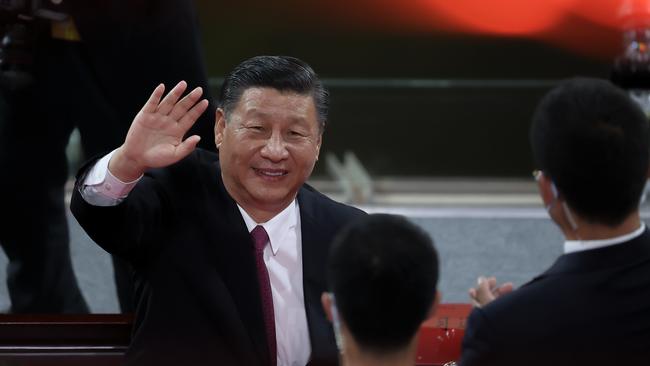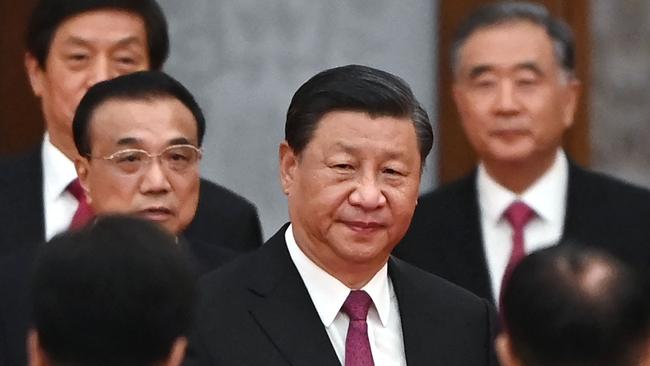China is being choked by Xi Jinping’s crackdown
Despite his seemingly wholesome intentions, President Xi Jinping’s authoritarian acts could be choking China’s once prosperous “miracle” economy.

World
Don't miss out on the headlines from World. Followed categories will be added to My News.
Coal. Meat. Wine. Cash. Beijing paints itself as playing a powerful game of coercive diplomacy. But the price may be a homegrown economic reckoning – with Chairman Xi Jinping’s authoritarian acts choking the nation’s “miracle” economy.
Xi wants the Chinese Communist Party (CCP) to return to its “original mission” of economic, social and cultural control. He wants to see a “rejuvenation of the great Chinese nation”.
Things weren’t going all that bad before he took power in 2012.
Economic growth was in the double digits. Innovation and confidence abounded as spirits soared.
Xi’s intentions sound good. He wants “common prosperity” for all. He wants China to become a world superpower on the back of being its factory for high-technology goods.

But his party has spent the first decade of his rule silencing dissent and strengthening its grip on every aspect of daily life. Abrupt and heavy-handed regulatory changes have investors and industry reeling. Economic growth is tanking. Property developers are panicking.
But that’s not part of Chairman Xi’s plan.
He’s determined to reshape the Chinese economy.
And he’s taking a heavy-handed approach to achieve this.
“Billionaires and celebrities and lots more are out. The middle class and total loyalty to Xi and the CCP are in,” Lowy Institute senior fellow McGregor writes in this week’s Foreign Policy.
But it is exacting a high price.
Xi Thought
Early in September, an obscure Chinese essayist hit the big league. His article was splashed across state-controlled social media. It even featured in the Communist Party’s premier publication – the Peoples Daily newspaper.
Author Li Guangman called Chairman Xi’s new drive for “common prosperity” a “profound revolution.”
He declared the nation’s financial markets would “no longer be a paradise for capitalists to get rich overnight”. He called on the PolitBuro’s to move swiftly on reigning in high housing and health care costs.
The essay was reflective of the pressures rising costs are having on China’s general public. The price of everything from beef and seafood, beans, peas, pork and rice are rising relentlessly. Add to that exorbitant housing prices, electricity outages and unstable employment environment – and you get a growing sense of unease.
This may be why the essay provoked an almost startling example of public political dissent.
The favourite of the Communist Party’s more hawkish elements, the Global Times, took Li to task. Editor Hu Xijin openly criticised the People’s Daily commentary as a “serious misjudgment and misleading … misunderstanding of the direction of the Party”.
Both articles drew the attention of the state censor, with strangely indecisive efforts to limit their reach.
It’s a rare insight into an internal Chinese political debate.
And there’s plenty to argue about.
China’s property price bubble is bursting bigtime.
Crunch time
The looming collapse of Chinese property developer giant Evergrande is just the tip of the iceberg. A similar collapse – that of the US-based financial services firm Lehman Brothers – triggered the Great Financial Crisis of 2007.
State-controlled media is loudly proclaiming it isn’t a problem.
It insists Beijing is all-seeing and all-powerful. So every company, institution, and citizen is just another tool in its extensive policy toolkit.
It’s a message fervently asserted by the Communist Party about itself.
Especially now.
Chairman Xi has been pushing his “Thought” when it comes to economics for months, even as his carefully cultivated public image elevates him to semi-deity status.
Not that anyone can disagree.
Censors prune social media posts of anything that can be construed as critical. And every time there’s a crisis, the details get buried, and positive Party-line messages get pushed.
It’s happening again.
Evergrande has invariably caught the attention of the Chinese public. Many of them are investors – either in the developer or the properties it has on its books.
But hundreds of smaller real estate developers have already gone bust so far this year. Many builders, contractors and suppliers are in distress.
This minor detail is missing from most approved public discussions.
Instead, the message is unanimous: Beijing is in control.
“Such confidence is far too complacent,” warns McGregor. “Chinese growth has been slowing for years, and the country faces a demographic crunch. Even if Evergrande isn’t a Lehman Brothers moment, it symbolises the start of a wrenching adjustment for the Chinese economy.”
Property collapse
Evergrande is about $US300 billion in debt. Much is owed to construction industry contractors and suppliers.
“In recent weeks, multiple city governments have stepped in to stop developers from discounting their properties too much in fire sales, lest they send the entire market into a death spiral,” says McGregor.
It’s all about a major cash crunch.
The Communist Party’s central Politburo decided to burst the nation’s overinflated property bubble last year. It initiated a “three red lines” policy – imposing hard limits on debt-to-asset ratios, debt-to-equity ratios, and cash-to-short-term-debt ratios.
What followed was an accounting.
The happy time for highly leveraged firms was over. Especially in real estate.
China’s internal statistics display a dramatic decline in property-based revenues.
Property values are being pronounced, instead of assessed, by regional valuers. Developers selling below these arbitrarily set prices have been sanctioned some 400 times so far this year.
Banks have significantly tightened lending requirements. As a result, the average Chinese mortgage rate is now running at over 6 per cent.
Amid it all, sales of construction equipment and materials are falling. That’s having a flow-on effect for iron ore and whitegoods manufacturing.
“The Evergrande crisis is more than a run-of-the-mill cyclic real estate downturn,” McGregor argues. “The same forces sweeping through Chinese politics, diplomacy, and technology are up-ending the economy and the vibrant private sector that has been its life force for decades.”
Systemic stress
Carnegie Institute analyst Michael Pettis says Evergande’s on-balance-sheet liabilities represent nearly 2 per cent of China’s annual GDP. Off-balance-sheet obligations may add up to another 1 per cent.
This brings us back to Beijing’s recently imposed “red lines”.
Highly indebted developers are suddenly unable to borrow more to meet repayments. So they’ve kicked off a fire-sale of assets and scaled-back activities. Such losses have only served to worsen their debt ratios, Pettis says.
And the fallout is gaining momentum.
“Potential homebuyers, frightened about what they read in the news, are becoming reluctant to close on homes, resulting in an already sharp decline in home sales,” he adds.
“What is more, they are likely to refuse to prepurchase unfinished apartments or put down deposits, except at large discounts, thereby squeezing liquidity and raising financing costs for the developers.”
Suppliers and contractors are being paid in real estate as a result. And they’re selling these off as fast as they can to pay their own commitments.
“The most worrying aspect of financial distress behaviour is that once it is set off, it often seems to spiral quickly out of control,” Pettis warns.
Helmsman Xi’s peril
Xi removed term limits from his high office in 2018. Essentially, he was setting himself up to be chairman for life.
But next year, he must go through the formality of asking for a third five-year term at the helm of the Chinese Communist Party.
An economic crisis could prove embarrassing.
As would the slightest hint of any internal opposition.
American Enterprise Institute analysts Hal Brands and Michael Beckley argue this places Xi in a fragile – and dangerous – position.
“China is turning away from the package of policies that promoted rapid growth. Under Xi, Beijing has slid back toward totalitarianism. Xi has appointed himself ‘chairman of everything’, destroyed any semblance of collective rule, and made adherence to ‘Xi Jinping Thought’ the ideological core of an increasingly rigid regimen. And he has relentlessly pursued the centralisation of power at the expense of economic prosperity,” they write in Foreign Policy.
“Objective economic analysis is being replaced by government propaganda. Innovation is becoming more difficult in a climate of stultifying ideological conformity … Xi hasn’t simply stopped the process of economic liberalisation that powered China’s development: He has thrown it hard into reverse.”
That comes with economic consequences.
But the Chinese Communist Party won’t tolerate any challenge to its image of infallibility.
When it comes to the wide-reaching financial fallout of the Evergrande crisis, blame needs to be apportioned. “The property business made Evergrande’s founder and boss, Xu Jiayin, super-rich, which makes him a perfect villain in an era in which the CCP will need plenty,” notes McGregor. “It’s no wonder (Xi) is looking for rich villains and greater loyalty. He will need both”.
Originally published as China is being choked by Xi Jinping’s crackdown





